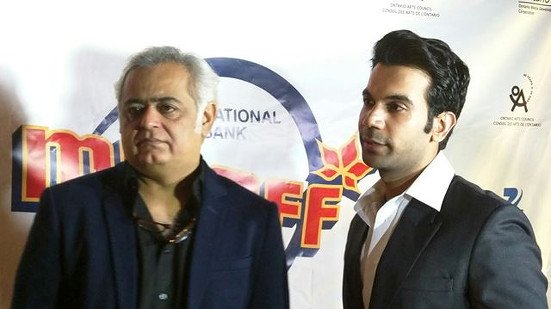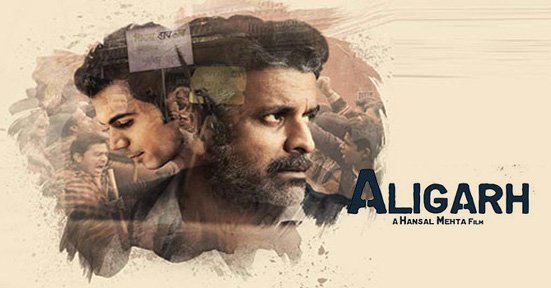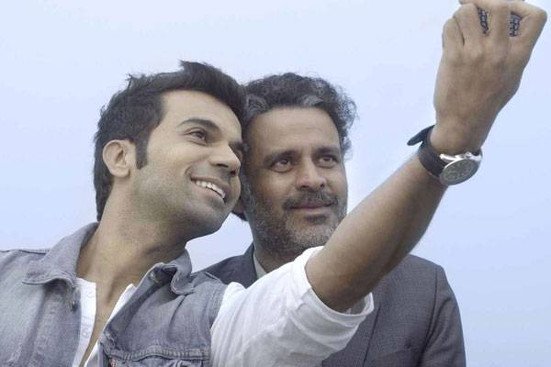
Hansal Mehta and Rajkummar Rao at MISAFF
As actor Rajkummar Rao and director Hansal Mehta attended MISAFF (Mosaic International South Asian Film Festival) in Canada to promote their film Aligarh, Minority-Review’s Swati Sharan got the chance to catch up with them. Here’s what they had to say about their film Aligarh, Bollywood and the Indian gay rights movement.
Could you tell us a bit about your film?
Hansal: Yes. Aligarh is an important film. I was just totally moved by the story. It’s based on a true incident. A young girl called Ishani Bannerjee sent me the story idea and Apurva Asrani, my long-time collaborator, developed it and wrote the screenplay. Incidentally, he also came out with this film. It’s unusual for Canadians to think that homosexuality can be illegal somewhere. But that is the truth. The physical act of sex between two homosexuals is illegal in India. And even if it was legalised, society’s attitudes towards alternate sexuality hasn’t evolved enough to talk about it openly.
Bollywood rarely sees an open confrontation of homosexuality or a questioning of any kind of sexuality for that matter. If anything is done, there’s more allusion involved. How do you feel about that?
Hansal: I think it has taken time, but it has happened. This year has been significant. There have been films in the past also like My Brother Nikhil. This year there was Kapoor & Sons, which handled this theme in a mainstream, format very commendably. So I think there is a change. We are confronting our own taboos.
But even with Kapoor & Sons, some may claim that no one’s come outright and said anything. It’s all implied.
Hansal: Well, I think that’s also a cultural phenomenon. As a culture, we don’t talk about sex. Forget sexuality. Even sex is implied. So to say we don’t come out in the open and talk about homosexuality might be slightly unfair. Our film culture, with censorship being imposed upon it, usually alludes to things rather than being direct.

Aligarh movie poster
How has the gay rights movement in India come to be more effective in recent times?
Hansal: The gay rights movement has been very vibrant in India. It’s been there since the ’80s when Ashok Row Kavi founded the Hamsafar Trust. They’ve done some phenomenal work for gay rights. Their magazine, Bombay Dost, celebrated 25 years recently. So the gay rights movement has been there. It’s been there much before apps like Tinder or Grindr. Bombay Dost was trying to get same-sex individuals to meet and date. It’s just that religion linked to politics has led to society seeing this as a taboo.
I don’t know if it’s my perception but it feels like there’s a lot more tolerance towards the gay rights movement in India in the last few years as compared with what we might have experienced in the ’90s.
Hansal: Who knows? (Looking at Rajkummar) Have you felt that way?
Rajkummar: I’m not that aware about the ’90s gay rights movement. But we have been a part of a lot of gay rights parades during our promotions for Aligarh. But yes, I think especially younger people are much more receptive towards the culture of LGBT now.
Hansal: I remember many years ago, there was a star whose butt Ashok Rao Kavi spoke about saying that it was sexy. And that star actually went and beat him up. That was the level of intolerance. Now people make a pass openly at Rajkummar and he doesn’t get squeamish about it. If you’re attractive to other men that just means you have a wider sex appeal!
So is this a gradual acceptance of these ideas?
Hansal: It’s an understanding. That’s where stories like Aligarh and Kapoor & Sons are important. Aligarh deals with old age, loneliness and longing. Kapoor & Sons deals with a contemporary setting with a young person. They deal with both the spectrums. There’s both an older and younger generation that never talks about it. The way these films have dealt with homosexuality has helped in creating an understanding.

Rajkummar Rao and Manoj Bajpai in Aligarh
What was it like doing a character based on a real person?
Rajkummar: Whenever I play a character based on a real person, I feel a sense of responsibility somewhere. I’m answerable to that person. And if that person’s not alive then I go according to the will of their family and friends. The same goes for Aligarh. So when Hansal told me about the real Deepu Sebastian, I spoke to him on the phone a couple of times. He was very kind. He gave me a lot of his recordings for me to understand the whole environment of being a journalist for an esteemed newspaper. I spoke to him about the whole case because he was closely involved with it when it was going on. He was standing with Professor Siras. In a way, he was his voice. So I think he was really helpful in that.
Did you study things like how he talks, stands or walks?
Rajkummar: No. I could not meet him. There was a lot of material available in the script. So I didn’t have to go through much research in that regard. But I tried to get his mental state right. I wanted to reach his psychology more than his physical appearance. Like he’s much shorter in height than me anyway.
Hansal: I think he’s brought to life Deepu Sebastian’s compassion or empathy. That is more important than the external things. It’s easy to copy. I can lose weight in a year and look like Mahatma Gandhi. But can I play Gandhi? It’s not about my size. I can still play Gandhi if I understand him or I am able to internalise Gandhi and his philosophy. Similarly, I think it is a lot about internalising characters. Plenty of people say, ‘I look just like him.’
Rajkummar: You have to try and reach the soul of the character.
You’ve worked in a wide repertoire of roles with some of the most prolific directors. Would you like to tell us how directing styles can be similar or different?
Rajkummar: I think all these new generation filmmakers like Hansal or Anurag (Kashyap) or Dibakear (Banerjee) or Abhishek Kapoor, for that matter, respect their actors a lot. They give them the kind of freedom to perform. They’re not very rigid about the characters in their mind. They’re open for discussion, which as an actor, I feel very happy about.
Hansal is one such director. When we make a film together, it’s teamwork. Hansal always guides me but he never tells me that this is exactly the way he wants it and I have to do it that way. He gives me the freedom and environment to perform, which really helps me when I am doing a scene.
Is there anything you’d like to say to your fans?
Rajkummar: Just keep watching our films and keep giving us your love.
Hansal: Keep supporting us. This is the second time we’re in Toronto. Rajkummar and I collaborated 3 or 4 years ago on a film called Shahid. Toronto was really special. We’ve been shown the love every time.



0
comments